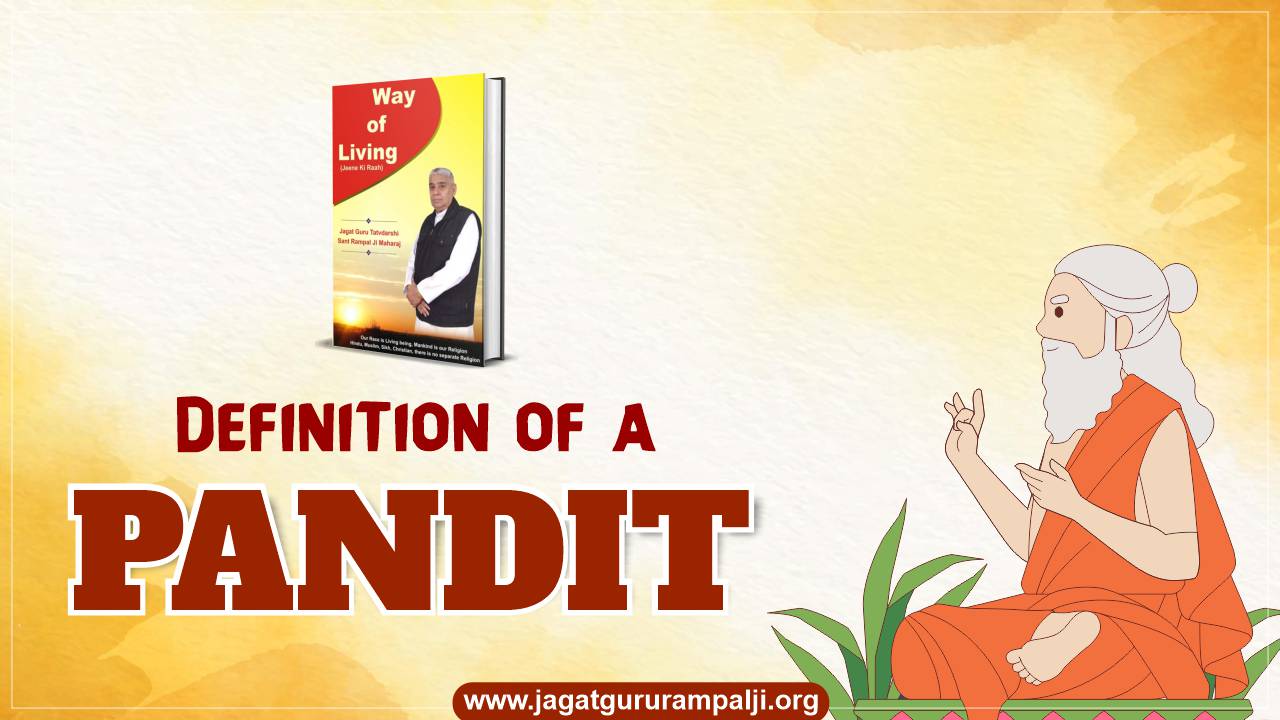
A learned person is called a Pandit. My venerable Guru ji was born in Brahmin caste, in village Bada Paintawas, tehsil Charkhi Dadri, district Bhiwani (Haryana). He never used to call himself a Pandit.
My grandfather Guru ji (Guru ji of my Guru ji) was a Jaat of village Chhawla (in Delhi near Najafgarh). Inspired by the satsang of Sant Gangeshwaranand ji at a young age, he went along with him to Haridwar. Sant Gangeshwaranand ji sent him to Kashi Vidyapith for studying. He had a sharp mind. He acquired the degree of Acharya in four subjects. Due to which, despite being a Jaat, he used to be addressed as Pandit Chidanand ji. He has an ashram in village Gopalpur (Tehsil-Kharkhoda, District-Sonipat, State-Haryana). There is a board on it, “Pandit Chidanand Ji (Garib Dasi) Ashram, Gopalpur”. His name was Chidanand ji. It was essential to tell the definition of a Pandit, so that no Brahmin brother takes offence. That is why, I have told it.
Sudama ji had taken birth in a Brahmin family. He was extremely poor. Many times, his children used to go to bed hungry. Sudama ji’s wife knew that Dwarika’s King Shri Krishna was a good friend of Sudama ji. His wife persuaded him many times that – “Please ask for some money from your King Friend Krishna.”Sudama ji used to say that – “It does not befit a Pandit to beg. Understanding the law of God, one to has to lead one’s life according to it.” Garibdas ji has also stated that: -
Garib, nat, perna kaanjar saansi, maangat hain bhathiyaare |
Jinki bhakti mein lau laagi, vo moti det udhaare ||
Garib, jo maangae so bhaduva kahiye, dar-dar firae agyaani |
Jogi jog sampurna jaka, maang na peevae paani ||
But on repeated requests of his wife, Brahmin Sudama ji went to his friend Shri Krishna ji. Shri Krishna ji offered special hospitality to him. Sudama had taken a handful of rice along with him that Shri Krishna ji ate with relish. Shri Krishna ji even washed Sudama ji’s feet, and when he asked about his wellbeing, Pandit Sudama said, “O God! I do not need anything. I am sustaining myself well by your grace.” After staying with Shri Krishna ji for a week, Sudama ji departed for his home. He did not even ask once for some money. He knew that: -
Kabir, bin maange moti miley, maangey miley na bheekh |
Maangan se marna bhalaa, yeh Satguru ki seekh ||
Shri Krishna ji was a king. Perceiving the state of his friend, he ordered Vishwakarma and within a week got a palace built for Sudama ji and also gave him a lot of wealth. Pandit Sudama stood by his righteousness and as a result of which, he gained all this. This is called a Pandit. One who begs is called a pimp. This is the definition of a Pandit.
The title "Pandit" doesn't denote a specific caste but refers to a person who has recognized the Almighty God and possesses true spiritual knowledge, good qualities, and have the mantras of salvation.
In our society, individuals belonging to the Brahmin caste are commonly referred to as "Pandits."
Yes, a person who is not a Brahmin can also be regarded as a "Pandit" if they possess genuine spiritual knowledge, the mantras of salvation, and have recognized the Almighty God as Kabir Saheb.
Sudama Ji was a close friend of Lord Krishna and steadfast a devotee. He possessed the qualities of a Pandit and, despite being in extreme poverty, he never resorted to unnecessary begging.
Sudama, born into a poor Brahmin family, refrained from seeking help from his dear friend, King Shri Krishna, despite his family's hardships. His wife encouraged him to approach Krishna for assistance, but Sudama believed that it was beneath a scholar to beg. Eventually, he visited Krishna, who warmly welcomed him and shared a simple meal of rice that Sudama had brought. Krishna also humbly washed Sudama's feet and inquired about his well-being. Sudama, overwhelmed by Krishna's hospitality, did not request any monetary aid, as he believed in the principle that true wealth comes without asking. Recognizing Sudama's integrity, Krishna had a palace constructed for him and provided him with wealth. Sudama's commitment to righteousness earned him this abundance, illustrating the true essence of a Pandit.
If you have any query regarding the above content, please email us at [email protected], we will try to solve it with proof.
Shailendra Gupta
From the time I was born, we have been accustomed to recognizing Brahmins solely based on their caste, rather than considering their actions or spirituality. Unfortunately, if someone does not belong to the Brahmin caste, it is often deemed inappropriate for them to participate in religious rituals. How can we determine who is truly qualified to perform religious rituals, and who can be called a Brahmin?
Satlok Ashram
Dear reader, we appreciate your engagement with our article. Currently, there is significant confusion surrounding the definition of a Brahmin. It is essential to emphasize that one's caste should not be the determining factor in matters of spirituality. A true Brahmin is someone who has a deep connection with the Almighty and can recognize the divine. Caste plays no role in one's spiritual journey. To gain a more profound understanding of the concept of a Brahmin, we recommend reading the book "Jeene Ki Rah" and listening to the spiritual discourses of Sant Rampal Ji Maharaj for clarity.